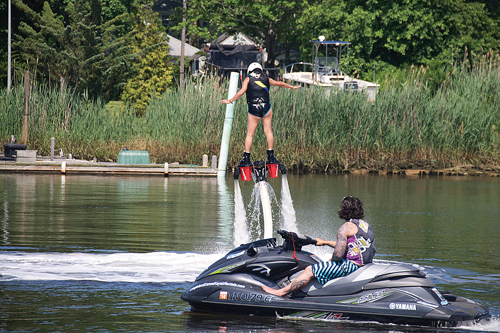Riverhead Town is pushing ‘flyboarding’ to sea

Since it launched earlier this summer in the Peconic River behind Treasure Cove Marina, Flyboard Long Island has been issued more than 20 summonses by Riverhead Town, which claims the use violates state navigation laws and other statute.
The Town Board is now drawing up new laws that would make flyboarding legal, but only if it’s done farther out in the bay.
“I’m going to cut right to the chase: This belongs in the bay,” Riverhead Supervisor Sean Walter said during a discussion of the issue at last Thursday’s work session.
“I don’t think it belongs on [the western] side of the 105 bridge,” Councilman John Dunleavy added.
In many of the summonses issued, the town has charged Flyboard LI with towing without an observer and not having a required safe boating certificate.
Mr. Walter instructed town bay constable Jim Divan to continue issuing tickets to Flyboard LI if they continue to operate.
Current town laws don’t specifically mention flyboarding, which is a relatively new sport in which people are thrust into the air by water-propelled jet packs on their feet. The device is powered by a JetSki and riders can go as high at 35 feet in the air.
However, officials say existing state navigation laws already apply to flyboarding. Those laws require an observer to be on hand in another boat when someone is participating in water sports.
The laws are not being followed, town officials maintain.
Town attorney Bob Kozakiewicz is drafting a new law that amends the town’s current code, which deals only with water skis, to include water propulsion devices including flyboards, jetpacks, Jetlevs and hoverboards. It also includes parasails and wakeboards.
Under the proposed regulations, all activities involving these devices would be banned within 500 feet of any shoreline, residential or commercial dock, pier or wharf. They would also be banned within any “channel system” and within 100 feet of any swimmer, bather or vessel.
Mr. Divan said someone was recently using a jetpack, which is similar to a flyboard, in East Creek in Jamesport.
Bryan DeLuca, executive director of the company that owns Treasure Cove, Long Island Aquarium and Hyatt East End, attended the meeting with James Bissett IV of Flyboard LI, but neither was permitted to speak at the work session.
“I don’t have the opportunity to speak here?” Mr. DeLuca asked.
“You will at the public hearing,” Mr. Walter said, indicating that some residents were also present last Thursday who wanted to speak against the Flyboard operation due to noise. Those residents were not permitted to speak either.
Mr. DeLuca and Mr. Bissett then got up and left the meeting.
Mr. DeLuca had provided the board with a copy of emergency laws the state of Maryland has recently instituted regarding what it terms “Jet Pack Vessels.”
“You should read the Maryland law because it’s very clear,” he told the board as he left.
The Maryland law doesn’t require flyboarders to stay quite as far out at sea as the town has proposed.
Maryland’s law requires Jet Pack Vessels to stay at least 100 feet from any bridge, structure, shore, wharf, pier, piling, mooring ball, buoy, vessel or person in the water.
It also requires that there be an observer on a navigable rescue vessel located at least 100 feet from the rider, but not more than 300 feet. In addition, the Jet Pack Vessel must be operated in at least six feet of water.
The Town Board plans to hold a public hearing soon on its proposed new laws regarding “water propulsion devices.”
“I think the board generally supports this sort of outgrowth of tourism. We like the idea,” Mr. Walter said.








